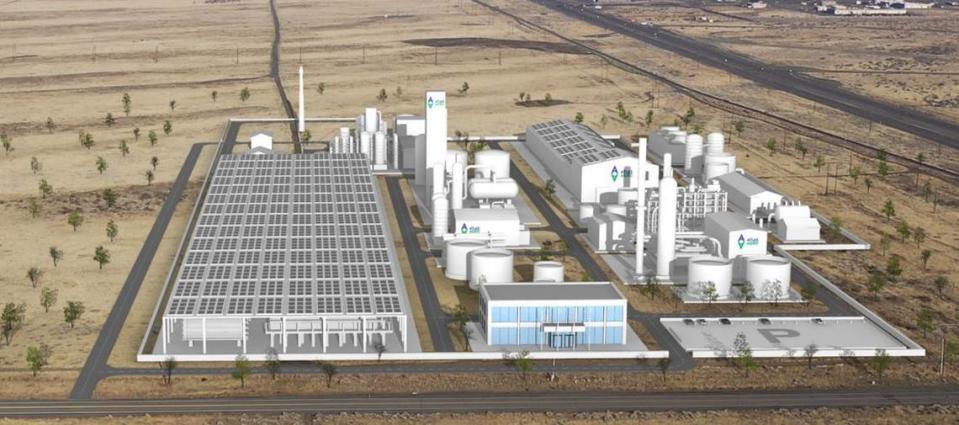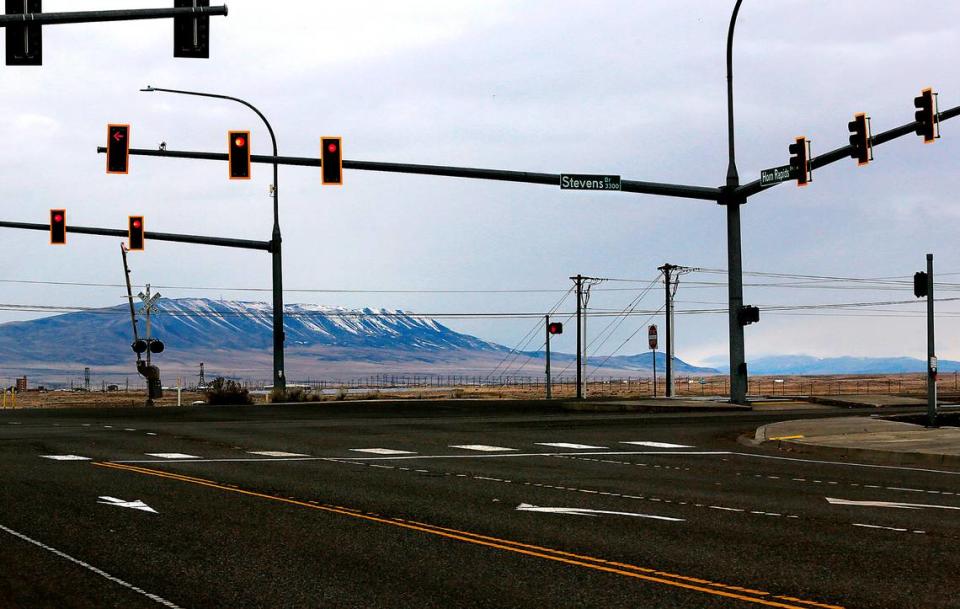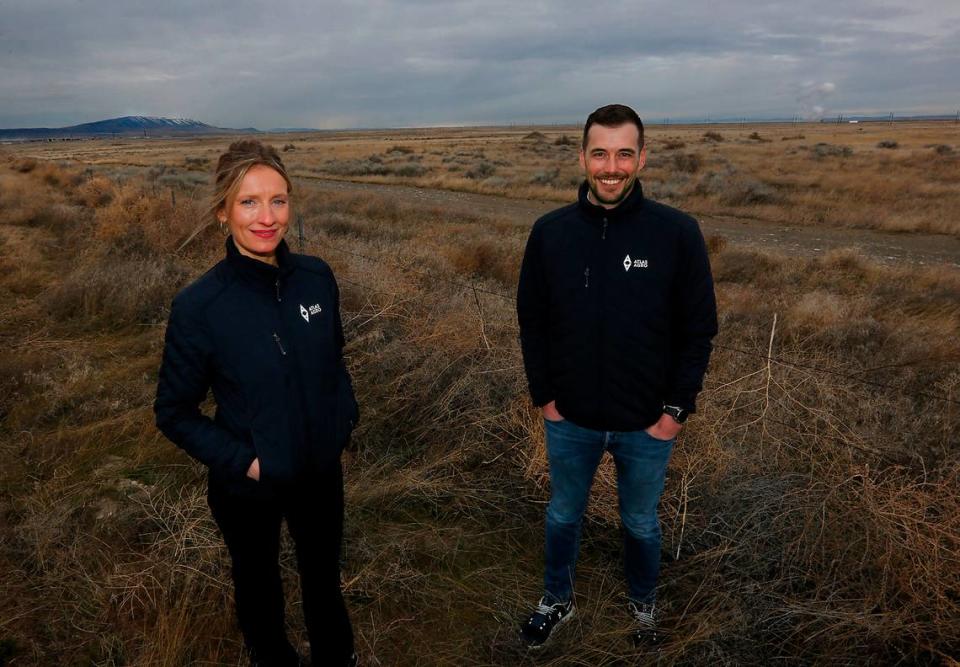WA Gov. Jay Inslee praises 1st-of-a-kind ‘green’ fertilizer plant planned in Richland
- Oops!Something went wrong.Please try again later.
Plans for an innovative $1.1 billion fertilizer plant in north Richland that could lead the world on cutting greenhouse gas emissions in the agriculture industry are moving fast, said Washington Gov. Jay Inslee.
He visited the Tri-Cities on Friday to meet with the Atlas Agro team planning a “green” fertilizer plant that would produce nitrogen fertilizer using clean energy and hydrogen separated from water.
Fertilizer production now contributes about 2% of all carbon emissions, Inslee said at a news briefing after meeting with Atlas Agro in Richland and Tri-Cities area legislators.
An Atlas Agro factory like the first one planned for Richland, the Pacific Green Fertilizer Plant, would reduce global carbon dioxide emissions equivalent to 500,000 cars, according to the company’s website.
The European fertilizer firm Atlas Agro has about 70% of the Richland project’s design completed, has raised $315 million in equity income and has started the permitting process, Inslee said.

In October, the Department of Energy announced that it will invest up to $1 billion in a clean energy hydrogen hub in Washington, Oregon and Montana with projects that are planned to include Atlas Agro’s plant after negotiations are completed.
In March, Atlas Agro signed a $9.1 million deal for 150 acres at Stevens Drive and Horn Rapids Road northwest of the Pacific Northwest National Laboratory. The deal with the Port of Benton followed eight months of discussion between Atlas Agro and the Tri-City Development Council.
“It looks like a real project with a real future,” Inslee said.
Richland power MOU signed
However, questions remain about powering the proposed project.
Atlas Agro plans to make hydrogen through water electrolysis using energy from renewable sources. Then it will split off nitrogen from the air to mix with the hydrogen to produce ammonia for ammonium nitrate fertilizer.
Heat produced as a byproduct of the plant processes also has potential agriculture uses, Inslee said, mentioning “potato projects.”
Atlas will need to secure up to 300 megawatts of electricity to power electrolyzers to produce hydrogen and then ammonia to make nitrogen fertilizers.
That is about three times more power than Richland currently requires to serve all its customers combined.

The city is getting behind Atlas Agro as the local utility provider, approving a memorandum of understanding to provide electricity to Atlas Agro at its Tuesday meeting.
The agreement essentially makes Atlas Agro a customer of Richland Energy Services, the city-owned utility. Atlas Agro will bear all expenses needed to deliver power via the Bonneville Power Administration.
It is the first in a series of agreements involving Atlas. On Dec. 19, the city council will consider a facilities agreement with BPA, which currently delivers about 110 megawatts to the city.
Clint Whitney, director of the city-run utility, confirmed the city doesn’t have 300 megawatts to spare.
Nevertheless, the new MOU states Richland is “willing and able” to serve the plant and notes that the city has submitted a request to BPA to connect Atlas to its system.
“The city is in between,” he said.
BPA limits new customers for its cheapest Tier 1 power to 10 megawatts.
Need for clean energy
None of the agreements specify how the electricity will be generated, though Atlas pledged its plant will rely on clean energy and mentioned “new nuclear” last spring when it agreed to buy land from the Port of Benton.
The proposed hydrogen hub to include the Richland fertilizer plant is planned to produce hydrogen by using existing clean and abundant hydropower resource to produce the greenest hydrogen in the nation, said a release from the offices of Sens. Patty Murray and Maria Cantwell, both D-Wash., in October.
The region is rich in hydropower, but a huge amount of additional power needs to be produced in the state as Washington builds a high tech economy with an industrial base in clean energy systems, Inslee said.
He mentioned the possibility of wind — including offshore wind — solar and fusion production, plus battery and pumped hydro storage.

The Tri-Cities area will need the governor’s help in legislators’ efforts to obtain more power from Bonneville Power Administration, said state Rep. April Connors, R-Kennewick, after Inslee’s discussion with Atlas Agro.
More power from BPA will drive innovation, and attract and recruit more companies like Atlas Agro, said Sen. Matt Boennke, R-Kennewick.
Continuing to produce reliable baseload power at the four lower Snake River dams in Eastern Washington is important to grid reliability and making the transition from environmental cleanup of the Hanford nuclear reservation to a clean energy center on former Hanford site land, which would include Atlas Agro, he said.
Connors also mentioned the need to work toward nuclear energy production.
The Atlas Agro plant would employ 160 people once it begins operations.
Gov. Inslee’s Tri-Cities visit
Inslee also on Friday got an update on another clean energy project at the Bioproducts, Sciences & Engineering Laboratory.
It is a joint laboratory of Pacific Northwest National Laboratory and Washington State University Tri-Cities on the WSU’s Richland campus.
He met with scientists, students and university officials to discuss PNNL’s efforts to create sustainable jet biofuel using cover crops as feedstock.
Earlier this year, the governor signed Senate Bill 5447, creating tax credits to incentivize production in Washington of sustainable aviation fuel.
Inslee’s day in the Tri-Cities also included a roundtable discussion on addressing the fentanyl crisis.
Sign Up: Boom Town Tri-Cities
Stay up to date on Tri-Cities growth and development with our weekly business newsletter. Get the latest on restaurant and business openings and closings, plus the region’s top housing and employment news. Click here to sign up. In your inbox every Wednesday.

